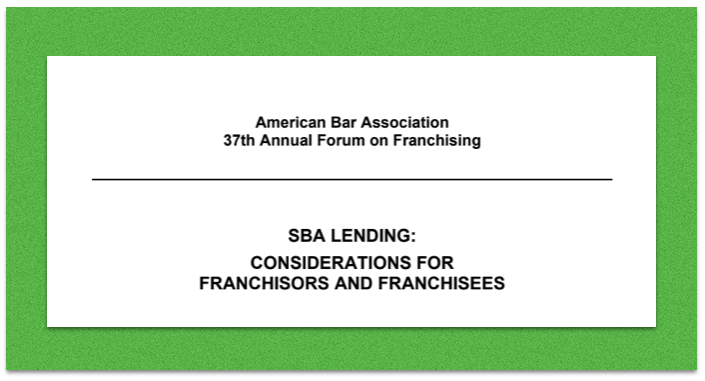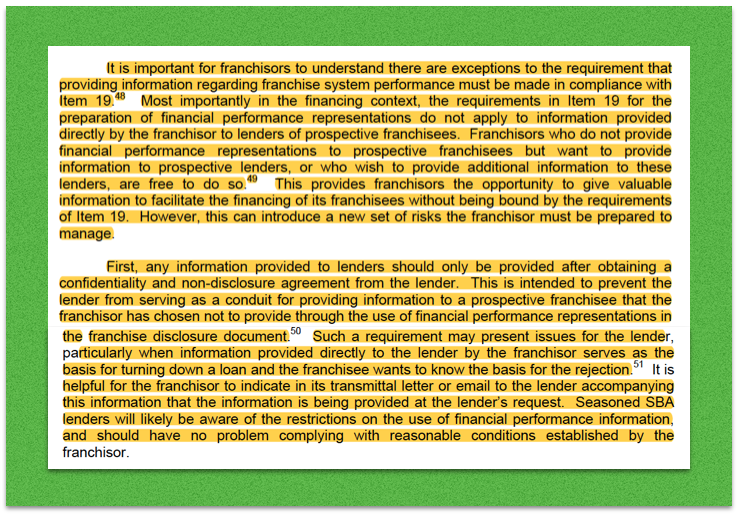In October of 2014, Stephen J. Olear, Chief Franchise Counsel for the United States Small Business Administration, presented a paper at the American Bar Association’s 37th Forum on Franchising. The paper was fittingly entitled, “SBA Lending: Considerations for Franchisors and Franchisees.”
I’d assume that Olear, as chief counsel for a powerful United States agency, had a lot of influence at that conference. His primary audience at an American Bar Association forum was, assumedly, franchise attorneys. And the reality is, almost all franchise attorneys represent franchiSORS… because that’s where the money is. FranhiSORS have far more money and power than franchiSEES. Franchising isn’t fair.
True, the paper itself states that “the opinions expressed by Stephen J. Olear in the paper and during the oral presentation are his own opinions and do not necessarily represent the views of the United States Small Business Administration,” but most people are smart enough to put 2 and 2 together. That’s just a disclaimer meant to protect the SBA. Olear had authority when he spoke. He was presenting at a conference using that authority. And the paper has authority because it has his name on it and because he was the chief counsel of the United States Small Business Administration.
In light of Senator Cortez Masto’s July 31st, SBA Franchise Loan Transparency Act of 2109, some of what Olear had to say is quite damning. The paper is available in full, if you’re interested, but I’m going to fast forward to the highlighted part on pages 15 and 16.
First of all, if you’re not familiar, the Federal Trade Commission requires franchiSORS to put together a long document called a Franchise Disclosure Document, or FDD. Attorneys are necessary! This document is extensive, cumbersome, technical and fairly difficult for all non-attorney parties to wrap their heads around. But, since the FDD is required by the FTC, all United States franchiSORS have attorneys help them write one.
“Item 19” refers to a section in the FDD where franchiSORS can elect to tell prospective franchiSEES how much money it might be possible to make in the franchiSORS’ system.
Now, importantly, the FTC does not require franchiSORS to make financial representations in item 19. It’s an option they can choose if they’d like. And, of course, if franchiSORS take the risk, they can expect that underperforming franchiSEES might try to hold them accountable for the numbers.
Makes sense.
Olear’s document goes on to read, “Franchisors who do not provide financial performance representations to prospective franchisees but want to provide information to prospective lenders, or who wish to provide additional information to these lenders, are free to do so.”
Let’s think about that for a minute.
FranchiSORS who don’t want to make financial representations in item 19 of the Franchise Disclosure Document (FDD) are free not to make them. The FTC does not require them to tell franchiSEES anything about how much money it’s possible to make in the franchise system. And, these VERY SAME franchiSORS who elect not to tell prospective franchiSEES anything about how much money it’s possible to make, are absolutely free to share financial information with the lenders.
Got it… okay. Lenders get the critical information, but franchiSEES don’t. The franchiSORS and the lenders get to share numbers together while keeping the franchiSEES in the dark. Um…. that doesn’t seem fair at all considering it’s the franchiSEE who is taking all the risk and the franchiSEE who is signing the loan.
But this is where we get to the sticky part.
Olear goes on to explain that, “this provides franchisors the opportunity to give valuable information to facilitate the financing of its franchisees without being bound by the requirements of Item 19.” Making a performance claim in the FDD is risky business for the franchiSORS because underperforming franchiSEES might try to hold franchiSORS accountable for that claim in Court.
But stay with me. It gets even stickier.
The problem is that the lenders aren’t following the rest of the SBA rules and the SBA isn’t enforcing them. The lenders back into the numbers in order to make it possible for the franchiSEES to qualify for the loans — even when the franchiSORS’ performance isn’t strong enough for it to be possible for franchiSEES to ever successfully make the loan payments!
So, naturally, the franchiSEES default and lose their home and life savings.
The lenders still make money because the loans are issued to the borrowers as subprime loans with high interest rates and can then be sold into the marketplace as SBA-backed government guarantee loans with much lower interest rates. The lender can make a profit right up front. The loans are very lucrative to the banks even if the loans go under in two years.
And then, of course, the taxpayers pay the 75 to 80% guarantee.
The lenders lose nothing.
The franchiSORS gain a franchise fee and whatever monthly royalty fee the franchiSEES’ site generates.
The franchiSEES lose everything they own.
Now comes the stickiest part.
This is the part where the Chief Franchise Counsel for the Small Business Administration goes to a conference in 2014 to teach franchiSORS’ attorneys how to get access to money from SBA loans while also keeping franchiSEES in the dark about actual financial performance.
“First,” Olear says, “any information provided to lenders should only be provided after obtaining a confidentiality and non-disclosure agreement from the lender. This is intended to prevent the lender from serving as a conduit for providing information to a prospective franchisee that the franchisor has chosen not to provide through the use of financial performance representations in the franchise disclosure document.”
Now, if Olear and the SBA were themselves completely in the dark about the whole fraud problem and were innocently teaching the franchiSORS’ attorneys a few regulations, this statement by Olear might not be be a big deal.
But that’s not what’s going on.
By 2014, the SBA was already very aware of the problem. They predicted the current crisis as early as 2002. And in 2011, three full years before Olear’s presentation to the American Bar Association, the Office of the Inspector General found fault in SBA lending practices.
The SBA Office of the Inspector General has no teeth. They can do investigations and write reports, but they can’t change the SBA’s actual practices.
But the Chief Franchise Counsel for the SBA can go to a conference to teach franchiSORS’ attorneys how to get money from the taxpayer and how to get franchiSEES to sign dangerous loan documents without knowing what’s going on.
Yes, franchiSEES really need Senator Cortez Masto’s SBA Franchise Loan Transparency Act of 2019 to pass.






